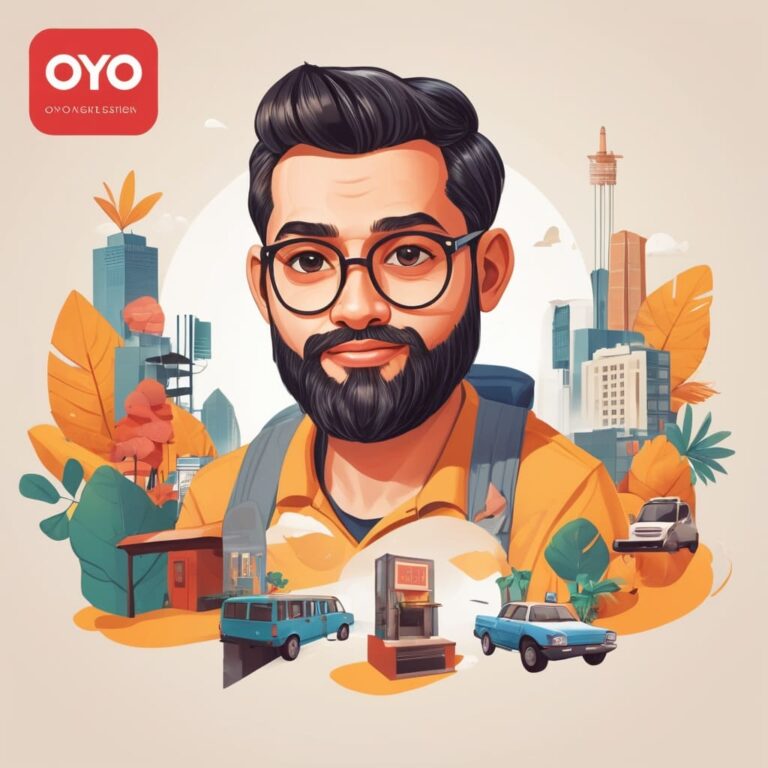Best Startups in India Part-2
- In part one of our exploration of the best startup in India, we delved into some of the most innovative and transformative companies shaping the country’s entrepreneurial landscape.
- These startups, spanning various industries, have not only addressed significant societal challenges but have also carved a niche for themselves in highly competitive markets.
- In this continuation, we will uncover more standout ventures that are leading India’s startup ecosystem into new realms of growth and impact. Each of these startups has demonstrated resilience, creativity, and a keen understanding of the evolving needs of modern society.
- By focusing on solving real-world problems through technology, sustainability, and customer-centric approaches, they have emerged as true disruptors. Join us as we highlight the next wave of the best startup in India, their unique journeys, and the mark they are leaving on both the national and global stages.
OYO (2013) – Transforming the Hospitality Industry in India

- Founder: Ritesh Agarwal
- Problem in Society
In 2013, India’s hospitality sector was highly fragmented, with inconsistent quality across budget hotels, poor customer service, and a lack of standardized accommodation.
Many travelers, especially in the budget segment, found it challenging to find affordable yet clean and comfortable lodging.
The unorganized nature of the budget hotel industry meant that customers had to deal with poor hygiene, varying room standards, and limited transparency in pricing.
This was a significant problem for a growing middle class, business travelers, and tourists who were looking for value-for-money accommodation but often ended up paying exorbitant rates for substandard services.
Furthermore, many small hotel owners struggled with low occupancy rates and lacked the expertise to run their establishments efficiently.
How OYO Provided the Solution
OYO, founded by Ritesh Agarwal in 2013, was designed to address these issues head-on.
The startup aimed to standardize the fragmented budget hotel market and offer customers a reliable and affordable alternative.
OYO initially started as an online platform aggregating budget hotels, but soon evolved into a full-scale hotel chain that leased and rebranded hotels to provide a consistent experience to travelers.
Through a combination of technology, branding, and operational excellence, OYO ensured that all properties under its banner adhered to strict quality control measures. This included everything from cleanliness to customer service, free Wi-Fi, air-conditioned rooms, and complimentary breakfast.
OYO provided small hotel owners with tools and training to improve their services, boosting occupancy rates and revenue while guaranteeing a better experience for customers.
OYO’s platform enabled easy booking through its app, transparent pricing, and customer reviews, making it more convenient for travelers to find and book rooms.
The model quickly became a success, making OYO one of the best Indian startups by offering both affordability and reliability to budget-conscious travelers.
- Challenges Faced by OYO
OYO’s journey, like many other successful best startup in India, has not been without challenges. In its early days, the biggest challenge was convincing hotel owners to join the OYO network and adhere to the company’s standards. Many small and medium-sized hotel owners were skeptical of relinquishing control over branding and operations to a third party.
Additionally, scaling the business quickly across multiple cities and countries presented operational difficulties. Maintaining consistent quality across thousands of properties required substantial investment in training, technology, and auditing. The company faced criticism for over-expansion, which led to issues related to maintaining service quality and overburdened staff.
OYO also faced legal and regulatory hurdles in several markets, especially as it expanded internationally. In some cases, hotel owners accused the company of unfair practices, while in other cases, OYO was criticized for aggressive growth tactics and management challenges.
During the COVID-19 pandemic, OYO faced significant disruptions, as the travel and hospitality industry was hit hard. The company had to undertake cost-cutting measures, including layoffs and restructuring, to weather the crisis. Despite these challenges, OYO emerged resilient and continued its efforts to streamline operations and innovate.
- Outline of Success
Despite the challenges, OYO remains one of the best startup companies in India and has grown to become one of the largest hotel chains in the world. Its success lies in its ability to address a massive market need with a technology-driven solution.
OYO’s model of standardizing budget accommodations has revolutionized the way people travel in India and beyond, making it one of the best startup in India.
OYO’s unique value proposition of providing consistent quality at affordable prices resonated with millions of travelers, and the company quickly expanded to over 800 cities across more than 80 countries. By 2019, OYO had become one of the fastest-growing Indian unicorn best startup, with a valuation of over $10 billion. Its rapid expansion, both domestically and internationally, is a testament to the vision and execution of its founder, Ritesh Agarwal, who became one of the most prominent Indian best startup founders.
OYO’s rise can also be attributed to its strong use of technology. The company used data analytics to optimize pricing and occupancy rates, ensuring that both hotel owners and customers benefitted from the platform.
This made OYO one of the most innovative startups in India in terms of leveraging technology to disrupt an established industry.
- OYO’s Place in India’s Startup Ecosystem
OYO’s success has made it a shining example within the best startup ecosystem in India, where it has played a key role in transforming the hospitality industry. It has inspired many other best startups in India to use technology to address problems in traditional industries. OYO‘s ability to scale quickly and adapt to different markets has also made it a model for best startup growth in India.
As one of the best startup in India, OYO has contributed to the development of Indian best startup culture, where innovation, technology, and customer-centric solutions are at the forefront of business models. The company has attracted significant investments in Indian startups, raising billions of dollars from global investors like SoftBank, Sequoia Capital, and Lightspeed Ventures, helping fuel its rapid growth and expansion.
OYO’s ability to survive and adapt during the COVID-19 pandemic also highlights its resilience and leadership within the future of best startup in India. The pandemic forced many companies to rethink their business models, and OYO used this time to streamline operations, enhance technology, and explore new business opportunities such as long-term rentals and co-working spaces.
- Future Growth
As of 2024, OYO continues to be recognized as one of the best startup in India in 2024, with plans to further expand its services and global presence. The company is working on strengthening its core hospitality business while exploring adjacent markets such as short-term home rentals, co-working spaces, and long-term stays. With the hospitality sector bouncing back after the pandemic, OYO is well-positioned to capitalize on the growing demand for affordable and standardized accommodation.
OYO’s future growth will likely focus on deeper market penetration in tier-2 and tier-3 cities, where the demand for budget accommodations continues to rise. By leveraging its strong brand recognition, technological infrastructure, and customer base, OYO aims to further solidify its position as one of the fastest growing startups in India.
OYO’s commitment to innovation also points toward the company exploring new technologies like AI, machine learning, and automation to improve customer experiences, streamline operations, and optimize revenue management. The company’s focus on enhancing both customer and hotel partner satisfaction will ensure its continued success as one of the most successful best startup in India.
- Conclusion
OYO’s journey from a small budget hotel aggregator to one of the best startup companies in India is a remarkable story of vision, innovation, and perseverance. Its ability to identify and solve a widespread problem in the hospitality sector has made it one of the leading startups in India. The company’s relentless focus on standardizing the unorganized hotel market, combined with its use of technology and data analytics, has set a new benchmark for the industry.
As one of the most well-known Indian unicorn startups, OYO’s growth trajectory shows how Indian startups are transforming industries by leveraging technology, customer insight, and innovation. OYO’s success will continue to inspire future entrepreneurs, shaping the best startup ecosystem in India for years to come.

Zomato (2008) – Redefining Food Delivery and Dining in India

Founders: Deepinder Goyal, Pankaj Chaddah
- Problem in Society
Before Zomato was founded in 2008, the food and dining sector in India was largely unorganized, with consumers often struggling to find reliable information about restaurants. The challenges included a lack of accessible menus, inconsistent reviews, and difficulty in comparing restaurant choices. Additionally, the food delivery segment was nascent, and consumers faced limited options to order food online from their favorite restaurants.
For restaurant owners, the challenge was equally daunting. They struggled with low visibility, customer acquisition, and inefficient delivery logistics. The dining and food delivery market was fragmented, with no comprehensive platform to bridge the gap between customers and restaurants. This created a huge demand for a platform that could simplify the dining experience for consumers while helping restaurants grow their business.
- How Zomato Provided the Solution
Zomato, one of the best startup in India, was founded by Deepinder Goyal and Pankaj Chaddah to address these issues. Initially launched as a website that digitized restaurant menus, Zomato’s mission was to provide users with reliable, detailed information about dining options. Over time, it evolved into a comprehensive food delivery and restaurant discovery platform.
The company’s initial offering focused on providing a platform where users could browse menus, read user-generated reviews, and make informed dining decisions. This was a game-changer for India’s food industry, as it simplified the decision-making process for consumers and provided restaurants with a digital presence they previously lacked.
As smartphones and internet usage grew in India, Zomato leveraged technology to transform itself into a leading startup in India. It introduced a food delivery service, allowing users to order food from their favorite restaurants with just a few clicks. This shift addressed the growing demand for convenient, at-home dining solutions and created a new revenue stream for restaurants.
Zomato’s innovative model empowered customers by providing detailed restaurant profiles, real-time ratings, and the ability to order food online. For restaurant owners, the platform offered a powerful way to increase visibility, grow customer bases, and manage deliveries more efficiently, making it one of the best startup companies in India.
- Challenges Faced by Zomato
Zomato’s rise to the top of the successful startups in India was not without challenges. In its early years, the startup struggled with monetizing its services. While providing free access to restaurant information was beneficial for users, finding a sustainable revenue model was a challenge for the founders. Zomato had to experiment with various business models, including advertising and premium listings for restaurants.
The entry of global competitors like UberEats and Swiggy into the Indian market also presented significant challenges. Zomato faced fierce competition in the food delivery space, leading to a race for market share. To stay competitive, Zomato had to heavily invest in logistics, customer support, and marketing, which increased operational costs. Managing a large fleet of delivery personnel and ensuring timely deliveries across cities presented logistical challenges, especially in traffic-heavy urban areas.
Additionally, Zomato had to deal with regulatory challenges and labor issues, especially regarding the treatment and pay of delivery personnel. Strikes and protests by delivery staff over low pay and poor working conditions caused disruptions in service. The company had to continuously address these concerns while trying to maintain operational efficiency and customer satisfaction.
During the COVID-19 pandemic, Zomato’s food delivery business was hit hard due to restaurant closures and lockdowns. The company faced significant financial strain, and it had to lay off staff to cut costs. However, Zomato responded quickly by expanding into grocery delivery and launching contactless delivery options to adapt to the new normal.
- Outline of Success
Despite the challenges, Zomato emerged as one of the best startup companies in India, with a strong presence in both the food delivery and restaurant discovery segments. Zomato’s ability to innovate and adapt to changing market dynamics has made it a household name in India and beyond. Its strategic acquisitions, partnerships, and continuous focus on improving the user experience have contributed to its success.
A major milestone in Zomato’s journey was its IPO in 2021, making it one of the first Indian unicorn startups to go public. The IPO was a huge success, with the company raising over $1.25 billion, reflecting strong investor confidence in its business model and growth potential. This event cemented Zomato’s position as one of the leading startups in India and showcased the growing influence of the startup ecosystem in India on the global stage.
Zomato’s global expansion strategy also played a key role in its success. The company expanded to over 24 countries, allowing it to capture new markets and diversify its revenue streams. Although Zomato eventually pulled out of several international markets to focus on its core operations in India, this expansion helped the company gain valuable experience and brand recognition.
- Zomato’s Place in India’s Startup Ecosystem
Zomato’s story is one of the most remarkable startup success stories in India. As one of the pioneers of the food tech industry, Zomato has been instrumental in transforming the way Indians dine and order food. Its success has inspired a new generation of entrepreneurs and helped strengthen India’s reputation as a hub for tech innovation. Zomato’s rise has also attracted significant investments in Indian startups, fueling the growth of the entire ecosystem.
Zomato’s business model has proven to be highly scalable, and its focus on leveraging technology to streamline the food delivery process has set a new benchmark for innovative startups in India. By continuously improving its app, delivery logistics, and customer service, Zomato has maintained a competitive edge in the market.
As part of the best startup culture in India, Zomato has been at the forefront of creating employment opportunities, especially for delivery personnel. The company’s contribution to the gig economy is significant, with thousands of delivery riders depending on the platform for their livelihood.
- Future Growth
As we look ahead to 2024 and beyond, Zomato continues to be a dominant player in the Indian food delivery space.
The company is focused on expanding its service offerings and exploring new revenue streams, such as hyperlocal deliveries and cloud kitchens.
Zomato’s investment in technology, including AI and data analytics, will help it optimize delivery routes, reduce delivery times, and enhance the overall customer experience.
Zomato is also exploring sustainable growth practices, such as reducing plastic waste in food packaging and promoting eco-friendly delivery options.
The company’s commitment to sustainability and innovation will play a key role in its future success.
Zomato remains one of the best startups in India in 2024, with a bright future ahead.
Its ability to continuously adapt to changing consumer preferences and market conditions will ensure its position as one of the fastest growing startups in India.
Zomato’s leadership team, led by founder Deepinder Goyal, remains committed to expanding the company’s footprint in the Indian market, particularly in tier-2 and tier-3 cities, where there is still significant room for growth.
With a strong focus on innovation, customer satisfaction, and operational efficiency, Zomato is poised to continue its journey as one of the Best Indian startups.
- Summary
Zomato’s journey from a small food discovery platform to one of the best startup companies in India is a testament to the power of innovation and perseverance.
As one of the leading startups in India, Zomato has transformed the way people dine and order food, creating a lasting impact on the food tech industry.
Through its relentless focus on improving customer experience, expanding its delivery network, and embracing new technologies, Zomato has become one of the most successful startups in India.
Its ability to adapt to changing market conditions and consumer preferences has ensured its place among the Indian unicorn startups.
Zomato’s success is not only a reflection of the company’s vision but also highlights the strength and potential of the best startup ecosystem in India.
As one of the pioneers in the food tech space, Zomato’s journey serves as an inspiration for future entrepreneurs, showing how Indian startups can scale and achieve global success.


Pingback: 10 Profitable Small Business Ideas for Women to Start Today
Pingback: Blinkit- A 3-Year Case Study- FY21-FY23 - DevelopWithUs